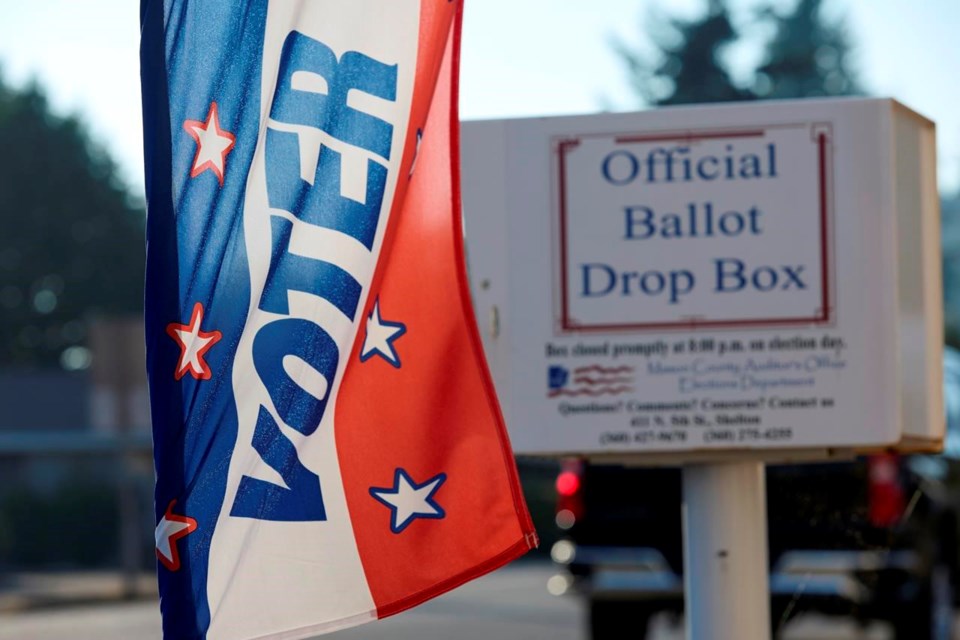WASHINGTON (AP) — The U.S. doesn’t have a government agency that tells the nation who’s won an election right away. Every state has its own process for counting votes, and news organizations play a key role.
The Associated Press is the only news organization that does all of the math, down to the county level, gathering voting information and passing it along to member news organizations and customers. Stephen Ohlemacher, AP Election Decision Editor, calls elections “ the single largest act of journalism that happens every two years.”
But it’s not a one-night affair.
Here’s how it works:
PREP, PREP AND MORE PREP
For years, AP has employed a full-time elections research team that works year-round to ensure that other AP entities involved in race calling — the vote count team, decision desk and newsroom — know as much as possible about what to expect once Election Day arrives.
That includes details that vary state to state on things like when and how people can vote, how those votes are counted and any changes since the last election.
Since different states count ballots at different times, it might take longer to declare a winner in some places. There are also varying rules on when recounts or runoffs might be necessary.
All of this means that we won't know who won every race on election night.
A MASSIVE UNDERTAKING
With political reporters based in key states around the country — and reporters on the ground in all 50 states — AP has an unparalleled footprint for election-related coverage in text, photos, video and live video. From the places they know the best, AP reporters are sending in what they're seeing at the polls and reporting any issues that arise.
Besides its own journalists, the AP has about 4,000 stringers — temporary freelancers — who, through years of trusted relationships with county clerks and other local officials, gather vote totals at the local level and feed them to AP's vote entry centers.
Hundreds of vote entry clerks answer those calls, take down the tallies and enter the results into AP’s election database. Since many states and counties display their election night results on websites, some clerks monitor those sites and enter results into the database, too.
ACCURACY MATTERS MOST
All the numbers are checked multiple times for accuracy.
Vote entry clerks ask questions to verify the information they're getting, like whether there are problems in the stringer’s county, and challenge the details if something seems off.
Automated checks also spot any issues with the data, like inconsistencies with a county’s previous voting history or other data. For example, if more votes are reported as being cast than there are registered voters in a county, an alert will pop up on the clerk’s screen and summon a supervisor.
AP’s team of full-time election research and quality control analysts monitor and examine the results for anomalies, using sophisticated statistical tools and AP’s own research to ensure accuracy.
In 2020, AP was 99.9% accurate in calling U.S. races, and 100% accurate in the presidential and congressional races for each state.
WHO MAKES THE CALLS — AND HOW?
On election night itself, race callers in each state are equipped with detailed information from AP’s election research team, including demographics, the number of absentee ballots, and political issues that may affect the outcome of races they must call.
According to Ohlemacher, about 60 people will be involved in declaring winners in more than 7,000 races across the country in this year's general election, with some specifically focusing on types of races, like Congress, gubernatorial and legislative contests.
The senior editors of AP’s decision team, based in Washington, provide the final approval on races for president, governor, U.S. Senate and key races for U.S. House, and consult with race callers around the country on other statewide races.
The AP does not make projections and will only declare a winner when it’s determined there is no scenario that would allow the trailing candidates to close the gap.
“When the votes come in and they meet our expectations, it makes it much easier to declare a winner,” Ohlemacher said. "When the votes come in and contradict what our expectations are, that’s when we slam on the brakes. We don’t call a winner until there is no path for the trailing candidate to catch the leader.”
___
Meg Kinnard reported from New York. She can be reached at http://twitter.com/MegKinnardAP
___
Check out https://apnews.com/hub/explaining-the-elections to learn more about the issues and factors at play in the 2022 midterm elections.
Follow AP’s coverage of the elections at: https://apnews.com/hub/2022-midterm-elections
Meg Kinnard And Almaz Abedje, The Associated Press



